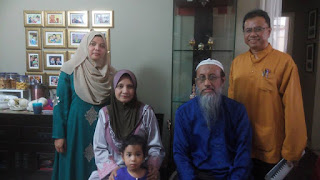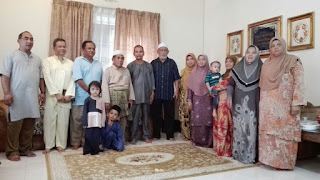I already knew I was a "4-Star" supervisor before and I know they have some criteria for all these ratings, but I have never aimed to be "4-star" or "5-star" or any form of glorification. It is just part of my job and in many parts visioneering in science. In reality, supervising is not a clean-cut matter but it is in fact a wilderness and we are often met with many problems, many ups and downs, frustrations, setbacks and of course hard work. It is only at times that one gets a surprising jolt of success. So, if somebody asked me what did I do to receive this rating, I don't really have a clue. What I can see that could be a common thread to what I have done so far is to look into problems that I considered interesting and these tend to be very hard. More often than not, students will not reach the intended problems that were set for them but they picked up interesting things along the way. Many of my students tend to go beyond the recommended duration of studies, trying to do this (running counter to the GoT KPI currently abuzzed). At times we are lucky that the solved problems attract interest of the international community and they get published in international journals. At other times, we just kept ourselves busy trying to do interesting things and some results may not even get published.
Digression from the block universe:
Have you GoT time?
Where GoT time?
Oh my GoT!
Perhaps another factor contributing to the rating, is the number of students that I have and had. If I want to be frank, it is more than I can really cope and indeed, at a given time, more than the average number that a theoretical physicist usually have (I can't find any study that confirms this but this is what I've gathered each time I meet with my international colleagues). Ideally, I could have limit myself to only a few students at a time by being more selective. In practice, this is harder to do due to
- expectations of higher number (irrespective of fields) from our superiors - we have some minimum KPI;
- the number of (supervising) theoretical physicists in the country is still small and I often get requests and appeals from potential students.
The other challenge was the background of the students; it tend to be not sufficient enough to embark on serious theoretical research and this often led to the lengthening of the duration of their studies. Until our theoretical curriculum matures to a better degree in the future, I guess, one just need to cope with this for some period of time. This is in a way, one of my hopes and wishes that the institute here could help - paving a way for better environment for theoretical sciences.
The institute in the past had many international visitors and they inject new ideas and a sense of urgency to be internationally competitive. Such intellectually motivating and international environment had helped many of our students. We hope indeed to be able to continue this tradition just like many other renowned international institutes. Lately, bringing international visitors here tend to get more and more difficult, particularly in the wake of recent reduced fundings. Facing the current reality, I dread the idea of going into a contraction phase and wish for some bright ideas or miracles to come along. For now, we simply have to strengthen up our local expertise.
This is our recurring theme of meeting ideals with realities. We often have good and sometimes grand plans in mind but reality tends to have this strange way of waking us up and meet harsher conditions and be spiritually hardened.





































